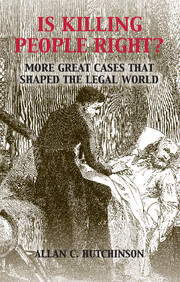Book contents
- Frontmatter
- Dedication
- Contents
- List of figures
- Preface
- 1 Introduction: on the road (again)
- 2 Is killing people right?: law and the end of life
- 3 Oil on troubled waters: the consequences of civil liability
- 4 The politics of law: cats, pigeons and old chestnuts
- 5 The companies we keep: the moralities of business
- 6 Fifty shades of Brown: consent and the criminal law
- 7 Putting up a defence: sex, murder and videotapes
- 8 Wade-ing into controversy: a case of accidental activism
- 9 Playing a different tune: fairness in deal making
- 10 Conclusion: surfing the tides
- Sources
- Index
- References
8 - Wade-ing into controversy: a case of accidental activism
Published online by Cambridge University Press: 05 May 2016
- Frontmatter
- Dedication
- Contents
- List of figures
- Preface
- 1 Introduction: on the road (again)
- 2 Is killing people right?: law and the end of life
- 3 Oil on troubled waters: the consequences of civil liability
- 4 The politics of law: cats, pigeons and old chestnuts
- 5 The companies we keep: the moralities of business
- 6 Fifty shades of Brown: consent and the criminal law
- 7 Putting up a defence: sex, murder and videotapes
- 8 Wade-ing into controversy: a case of accidental activism
- 9 Playing a different tune: fairness in deal making
- 10 Conclusion: surfing the tides
- Sources
- Index
- References
Summary
The Supreme Court of the United States is no stranger to controversy. Its history is full of cases that have plunged the court into moral and social dilemmas of the most heated kind. As such, the justices have waded into or been thrust into deciding matters where others have feared (or been wise not) to tread. Unsurprisingly, some of its decisions have served to fan the flames of discord rather than douse them. Yet the US Supreme Court, like other highest courts of common law countries, has retained popular respect because it has managed to take a Goldilocks-style approach – not too far ahead of public opinion and not too far behind. While it might not always have been ‘just right’ in its decisions and opinions, it has succeeded in spotting and riding the incoming tide of social change in contentious matters, like school desegregation and gay rights.
However, one area of controversy that refuses to resolve itself or go away is abortion. It remains one of the most hotly contested areas on the social, moral, political and constitutional agenda. Despite the Supreme Court's 1973 decision to establish and protect a right for women to obtain an abortion, the debate around the existence and extent of such a right remains more embittered then ever. Indeed, the Supreme Court's decision in Roe v. Wade (and its legal repercussions) has become something of a lightning rod for supporters and opponents of a woman's right to choose. Whereas some harangue the decision for providing any constitutional protection for women's right to terminate a pregnancy, others criticise it for its failure to provide a compelling and solid basis for securing that right. All in all, the Roe decision has succeeded in satisfying few and alienating many.
In spite of or perhaps because of its notoriety, Roe v. Wade is accepted as one of the common law's greatest cases.
- Type
- Chapter
- Information
- Is Killing People Right?More Great Cases that Shaped the Legal World, pp. 114 - 131Publisher: Cambridge University PressPrint publication year: 2016



